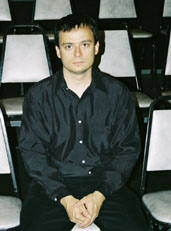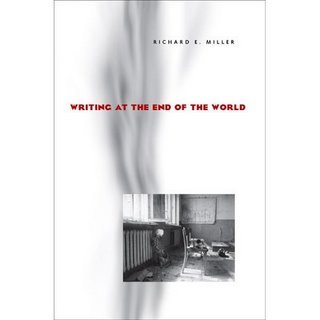
Rusty Banks is a composer/guitarist/teacher originally from Jasper, AL, now living in Pennsylvania.
His compositions benefit from themes relating to regions or environments. For example, his composition commissioned by the Alabama Music Teacher Association's 2004 convention featured audio samples from the Cahaba River, Alabama's last free-flowing river. Another work, "Long Pine Creek: New Year's Day," uses sounds from Long Pine Creek in Nebraska. His compositions range from traditional concert music to sonic installations where boom boxes are scattered throughout a room. His music is described as thoroughly modern, yet accessible, a description he shudders at, but reluctantly accepts. His compositions may be heard on Living Artist Recordings, as well as his web site, rustybanks.org.
|

Sunday, August 12, 2007
Worlds end. And Worlds begin.

Writing at the End of the World by Richard Miller
I’ve been reading Richard Miller's Book about the place of humanities in education and in life. It’s a thought-provoking read for anyone working in any purely creative field, though it is written from the prospective of someone who teaches writing.
The book searches for the purpose (point?) of things like poetry, prose, and music through the lens of a handful of tragedy’s that have become part of our collective conscience: Columbine, The Unabomber, Chernobyl, 9-11. What place does something like a poem have in a world like this? Further more, what are we to teach people in our fields?
Miller gives part of his answer, or at least a reason for pursuing an answer, at the end of the preface.
“Schools currently provide extensive training in the fact that worlds end; what is missing is training in how to bring better worlds into being.”
The book is not a new-agey feel-good testament to the healing power of the written word. It is a rigorous examination of assumptions about the limits of, place of, and usefulness of creative work. It is an exercise in critical optimism.
Educators, especially those in the arts and humanities, will find many of the questions they ask themselves tackled in this well-researched, probing book.
posted by Rusty Banks
|
| |



